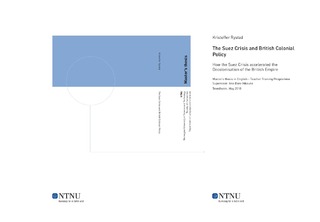| dc.description.abstract | The thesis is an analysis of how and why British colonial policy changed after the Suez Crisis in 1956. The thesis is centred around British colonial policy but takes into account a range of other factors influenced by the crisis, such as British economy and international standing, economy of the Empire, British loss of prestige at Suez, Anglo-American relations, anti-colonialism in the United Nations, European decolonisation in Africa, the Cold War and African nationalism. The crisis was a watershed for British colonial policy because the crisis made the British accelerate the process of decolonisation. In cooperation with the US, the British wanted to secure an informal Empire by continuing their influence in former colonies. Fear of Soviet intervention in Africa and pressure from colonial nationalist and the United Nations, external factors that were reinvigorated by the Suez Crisis, threatened to sabotage plans of an informal Empire and turn former colonies towards the Soviet Union. Combined with the economic struggles of Britain, the Suez Crisis and the effects of it was central to changes in British colonial policy, and therefore the Suez Crisis was a watershed that accelerated the process of decolonisation heavily. | nb_NO |
